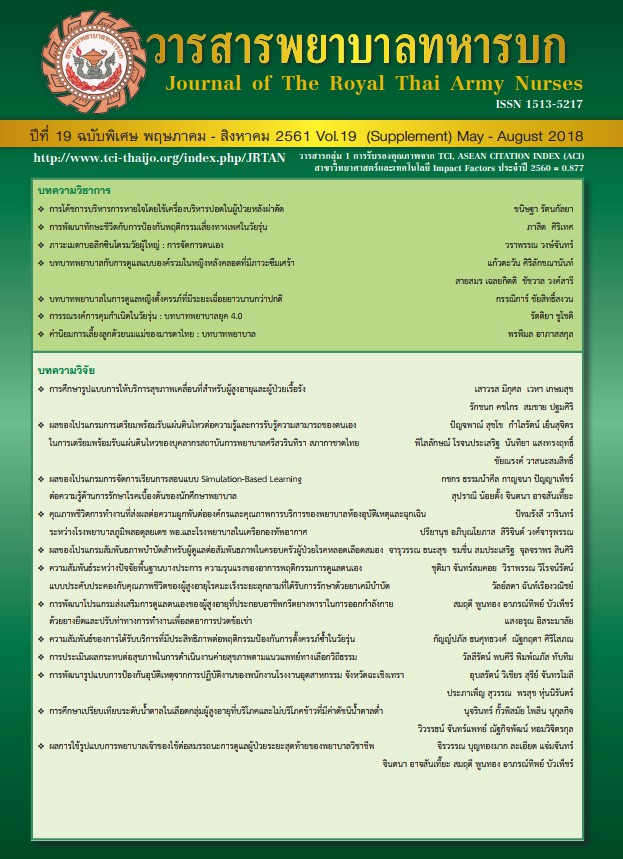The Effects of A Therapeutic Relationship Program for Caregivers of Patients with Stroke on Family Relationships
Keywords:
therapeutic relationship program, family relationship, caregivers of stroke patientsAbstract
The present study was based on a quasi-experimental research design aimed at studying the effects of a therapeutic relationship program for caregivers of patients with stroke on family relationships. The research sample was 60 caregivers that were taking care of stroke patients. They were 18 years of age and above and were living in Phakphai district in Ayutthaya, Thailand. They met the inclusion criteria and were randomly assigned to the therapeutic relationship group program and the control group. There were 30 caregivers in the therapeutic relationship group program and 30 caregivers in the group receiving regular caring activities. The therapeutic relationship program was validated for content validity by 3 professionals using the family relationship scale, with a Cronbach’s alpha coefficient reliability of .92. Data were analyzed using descriptive statistics and t-test. According to the findings after providing the therapeutic relationship program, the stroke patients’ caregivers of the therapeutic relationship group program had higher post-test family relationship mean scores (M = 66.20, SD = 2.47) than the pre-test family relationship mean scores (M = 56.07, SD = 2.60) (p<.001, t = 14.23). Furthermore, the mean difference between the pre-test and post-test family relationship mean scores for the therapeutic relationship group program ( = 10.13, SD = 3.85) was significantly greater than the mean difference between the pre-test and post-test family relationship mean scores for the group that received regular caring activities ( = .07, SD = .25) (p<.001, t = 13.73).
Downloads
References
Dangsuwan P. Textbook stroke. Bangkok: Klaimorkanpim; 2007. (in Thai)
Chaiwongsa A. Results of using the good quality life support program among family members of terminally ill patients at Nakornping hospital, Chiang Mai province [Thesis]. Chiang Mai University; 2012. (in Thai)
Chanprachon J. Family attachment and the process of family management in caring for stroke patients [Thesis]. Christian University; 2007. (in Thai)
Oupra R, Ruengkhome CH, Wongpalee J, Kantawong EK. Stroke caregivers’caregiving experiences. Rajabhat Journal of Sciences, Humanities & Social Sciences. 2011; 12(2): 50-59. (in Thai)
Koonnarong O. Caregiving preparedness, family relationships and role strain among caregivers of Muslim stroke patients. Princess of Naradhivas
University Journal. 2012; 4(1): 14-27. (in Thai)
Suwannaboon W. The effect of Interpersonal group therapy on quality of life in schizophrenic patients [Thesis]. Burapha University; 2014. (in Thai)
Stinnett. Strong families: A Protrait. Prevention in Family Services. BeveryHills: National Councilon Family Relations; 1983.
Peplau HE. Interpersonal relations in nursing. New York: G. P. Putnam & Sons; 1952.
Crandall RC. A behavioral science approach. Massachusetts: Addison-Wesley. 1980; 410-411.
Grove, K. S., Burns, N. & Gray, R. J. (2013). The practice of nursing research: appraisal, synthesis, and generation of evidence.
Crandall RC. A behavioral science approach. Massachusetts: Addison-Wesley. 1980; 410-411.
Wongpanarak N. The Therapeutic Relationship: Application in Nursing Process. Journal of The Royal Thai Army Nurses. 2014; 15(2): 84-91. (in Thai)
Titawattanakul A. The effects of a therapeutic relationship program on the self-esteem among girls exposed to violence in a central region reception home for girls [Thesis]. Thammasart University; 2017. (in Thai)
Downloads
Published
How to Cite
Issue
Section
License
บทความหรือข้อคิดเห็นใดใดที่ปรากฏในวารสารพยาบาลทหารบกเป็นวรรณกรรมของผู้เขียน ซึ่งบรรณาธิการหรือสมาคมพยาบาลทหารบก ไม่จำเป็นต้องเห็นด้วย
บทความที่ได้รับการตีพิมพ์เป็นลิขสิทธิ์ของวารสารพยาบาลทหารบก
The ideas and opinions expressed in the Journal of The Royal Thai Army Nurses are those of the authors and not necessarily those
of the editor or Royal Thai Army Nurses Association.






